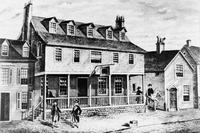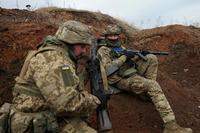WASHINGTON -- After nearly three weeks of appealing to the United States and other allies for help restoring Niger’s president to power, friends and supporters of the democratically elected leader are making a simpler plea: Save his life.
President Mohamed Bazoum, leader of the last remaining Western-allied democracy across a vast stretch of Africa’s Sahara and Sahel, sits confined with his family in an unlit basement of his presidential compound, cut off from resupplies of food and from electricity and cooking gas by the junta that overthrew him, Niger's ambassador to the United States told The Associated Press.
“They are killing him,” said the ambassador, Mamadou Kiari Liman-Tinguiri, a close associate who maintains daily calls with the detained leader. The two have been colleagues for three decades, since the now 63-year-old president was a young philosophy instructor, a teacher’s union leader, and a democracy advocate noted for his eloquence.
“The plan of the head of the junta is to starve him to death," Liman-Tinguiri told the AP in one of his first interviews since mutinous troops allegedly cut off food deliveries to the president, his wife and his 20-year-old son almost a week ago.
“This is inhuman, and the world should not tolerate that,” the ambassador said. “It cannot be tolerated in 2023.”
On Saturday, the president’s captors allowed a doctor to visit the family for the first time, and brought some food, a presidential adviser told the AP. The adviser, who was not authorized to speak publicly and spoke on condition of anonymity, declined to give details.
Bazoum sits in the dark basement, the ambassador said. He answers the phone when a call comes in that he knows to be his friend or someone else he wants to speak to. The beleaguered president and his ambassador, whom junta members have declared out of a job, talk one or more times a day.
Bazoum has not been seen out in public since July 26, when military vehicles blocked the gates to the presidential palace and security forces announced they were taking power. It is not possible to independently determine the president's circumstances. The United States, United Nations and others have expressed repeated concern for what they called Bazoum's deteriorating conditions in detention, and warned the junta they would hold it responsible for the well-being of Bazoum and his family.
Separately, Human Rights Watch said Friday it had spoken directly to the detained president and to others in his circle, and received some similar accounts of mistreatment.
However, an activist who supports Niger's new military rulers in its communications said the reports of the president's dire state were false. Insa Garba Saidou said he was in contact with some junta members but did not say how he had knowledge of the president's lot.
“Bazoum was lucky he was not taken anywhere,” Saidou said. “He was left in his palace with his phone. Those who did that don’t intend to hurt Bazoum.”
Niger's military coup and the plight of its ousted leader have drawn global attention -- but not because that kind of turmoil is unusual for West Africa. Niger alone has had about a half-dozen military takeovers since independence in 1960. Niger leaders have suffered in coups before, most notably when a military-installed leader was shot down in 1999 by the same presidential guard unit that instigated the current coup.
Niger's return to reflexive armed takeovers by disgruntled troops is reverberating in the U.S. and internationally for two key reasons. One is because Bazoum came to power in a rare democratic presidential election in the Africa's unstable Sahara and Sahel, in the only peaceful, democratic transfer of power that Niger has managed.
The United States alone has invested close to $1 billion in Niger in recent years to support its democracy and deliver aid, in addition to building national forces capable of holding off north and west Africa's al-Qaida- and Islamic State-allied armed groups.
The U.S.-backed counterterror presence is the second key reason that Niger's coup is resonating. Americans have a 1,100-strong security presence and have built bases in Niger's capital and far north into its main outposts to counter West Africa's armed jihadist groups. The Biden administration has yet to call what has happened in Niger a coup, citing laws that would obligate the U.S. to cut many of its military partnerships with the country.
Niger's region is dominated by military or military-aligned governments and a growing number of them have entered security partnerships with Russia's Wagner mercenary groups.
The soldiers who ousted Bazoum have announced a ruling structure but said little publicly about their plans. U.S. Under Secretary of State Victoria Nuland met with Niger's junta members in the capital this week but called them unreceptive to her demands to restore Niger's democracy.
“They were quite firm about how they want to proceed, and it is not in support of the constitution of Niger,” Nuland told reporters after.
The junta also told Nuland that Bazoum would die if the regional ECOWAS security bloc intervened militarily to restore democracy, U.S. officials told the AP.
Late this week, the ambassador shrugged that threat off, saying the junta is already on track to kill Bazoum by trapping his family and him with little more than a shrinking supply of dried rice and no means to cook it.
Secretary of State Antony Blinken has spoken several times with the detained president and expressed concern for his and his family's safety. The U.S. says it has cut some aid to the government and paused military cooperation. Blinken has expressed broad support for ECOWAS, whose diplomatic efforts have been spurned by the Niger junta and which has warned of military force as a last resort.
Blinken said in a statement Friday he was “particularly dismayed” that Niger's mutinous soldiers had refused to release Bazoum's family as a goodwill gesture. He gave no details.
While the junta adviser Saidou denied that the junta threatened to kill Bazoum if ECOWAS invaded, he said Bazoum's death would be inevitable if that happened.
“Even if the high officers of the junta won’t touch Bazoum, if one gun is shot at one of Niger’s borders in order to reinstate Bazoum, I’m sure that there will be soldiers who will put an end to his life," he said.
Bazoum told Human Rights Watch that family members and friends who brought food were being turned away, and that the junta had refused treatment for his young son, who has a heart condition.
Bazoum and his undetained allies want regional partners, the U.S. and others to intervene. With Bazoum vulnerable in captivity, neither he nor the ambassadors specify what they want the U.S. and other allies to do.
Bazoum is a member of Niger's tiny minority of nomadic Arabs, in a country of varying cultures rich in tradition. Despite his political career, Bazoum has retained his people's devotion to livestock, keeping camels that he dotes on, Liman-Tinguiri said.
For all his deprivations, the ambassador said, Bazoum remains in good spirits. “He is a man who is mentally very strong,” he said. “He’s a man of faith.”
___
Associated Press writer Sam Mednick contributed from Niamey, Niger.












